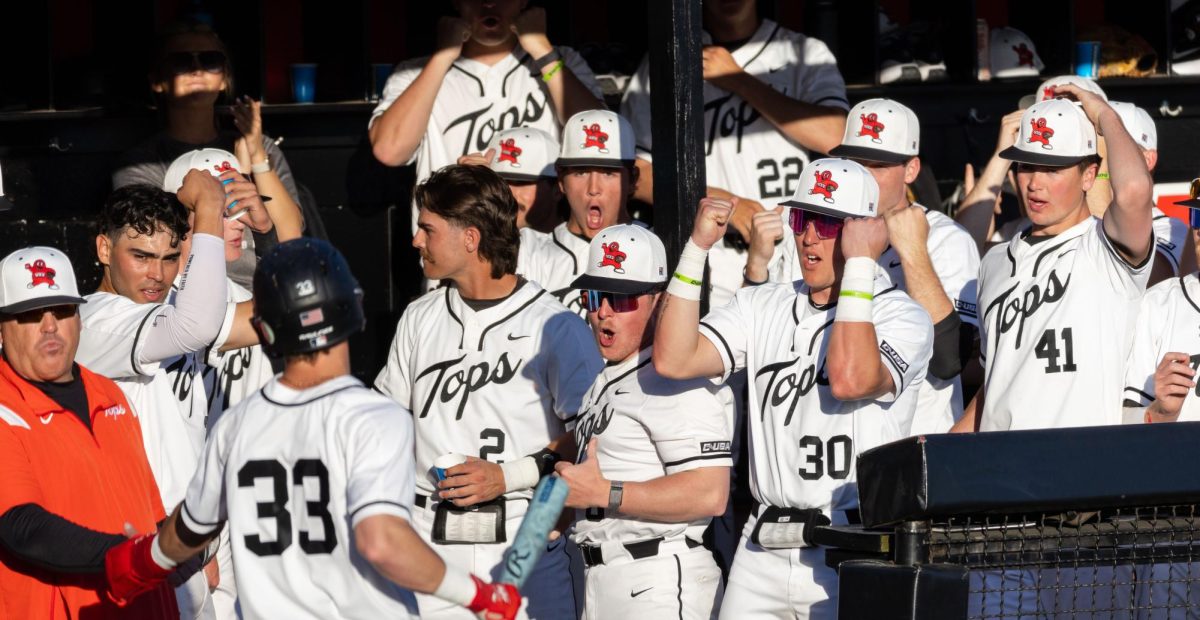SGA approves nominations, discusses budget
Student Body President and Student Regent Cole Bornefeld addresses Western Kentucky University’s Student Government Association during the second session of the spring semester on Tuesday evening, Jan. 24, 2023 in the SGA chambers on campus in Bowling Green, Ky.
January 25, 2023
Within the halls of the Downing Student Union, music blasted from the senate chambers on the second floor. Sounds of laughter and jovial conversation announced the second meeting of the semester for the Student Government Association.
During the roughly hour-long meeting, SGA approved five nominations, discussed budget and legislative actions and entertained the idea of a Constitutional amendment.
The meeting began with SGA President Cole Bornefeld submitting for legislative approval four positions left vacant by study abroad, schedule conflicts or graduation.
The first nomination was of Adan Canizalez as chair of student enrollment and experience. Canizalez was serving as vice chair of the committee last year and has been the “sidekick” to the past chair, Jenna Wells, who is now studying abroad in Greece.
In Wells’ absence, Canizalez served as interim chair, which he said makes him prepared for the job.
“He has definitely stepped up to the plate last semester,” Bornefeld said.
Potter College of Arts & Letters senator Meghan Pierce spoke in favor of Conizalez, saying he has done a great job on the committee last semester.
“I highly encourage you to vote for Conizalez […] he’s very qualified,” Pierce said. “He’s been doing a great job acting as our chair right now, and he’s very creative and very flexible to work with.”
Bornefeld’s second nomination was for Miah Cisco, a former senator who had to leave due to her studying abroad.
“I know she is ready to return back to work,” Cole said. “She just returned from studying abroad last fall.”
Cisco said she is excited to return to the senate, saying she is proud of the work she did for the university in prior senates.
“Before I left my big project was to work with Bryan Russell […] and I got him to install four benches at South Lawn,” Cisco said. “I’m hoping to join back on that same committee and make a change on campus.”
He also nominated Abby Haynes, a senior, for a senator-at-large position.
“She is very involved on campus,” Bornefeld said. “I believe she will be a great asset to the senate. I think she will also bring a unique perspective as a senior.”
Haynes said she is interested in committees where she can best serve. She does not have any policy she would like to see put forth but she would like to leave WKU “better than she found it.”
“As a marketing major, I know that the first thing you do is recognize a problem and then work backwards to try and solve it,” Haynes said. “So, with this being my last semester […] being more aware of things going on around me, things I think could be better here on campus […] I’ll try and make those changes.”
Finally, Bornefeld nominated Miles Huff to the Judicial Committee to fill the vacancy left by Holden Schroeder, who previously served as chief justice before Justin Goins.
Huff was previously the captain of the track team, a political science major and a senior.
“I don’t think we’ve had an athlete in SGA in several years,” Bornefeld said.
Huff said his seniority on the team allows him flexibility to serve on the Judicial Committee. He has no prior judicial experience, Huff said.
“I’ve had the pleasure of representing Western on the cross country track these last four years,” Huff said. “It’s been one of my greatest pleasures to go around the country and represent our school and allow everybody to experience Western for what it is. I look forward to working [for SGA].”
Though Huff is filling the vacancy for Schroder, he will not become chief justice. Goins is the current chief justice and nominated Isaac King as the new associate chief justice.
All five nominations were confirmed unanimously and sworn in by Goins at the end of the meeting.
Also during the meeting, Sam Kurtz, administrative vice president, pushed for senators to sponsor more resolutions because of the dwindling SGA budget.
“If there is a problem on campus there’s not a solution, but a resolution,” Kurtz said. “Right now we have a current 12-1 ratio of bills to resolutions, which isn’t terrible, but I feel with there only being a couple thousand left for bills we can vote more resolutions.”
According to Julie Mishchuk, speaker of the senate, a resolution uses university funds while bills draw from the SGA budget. Every fiscal year SGA receives $100,000 for bills and other actions, Mishchuk said. Currently, the budget has $39,460.76 remaining.
Towards the end of the meeting, Mishchuk called for discussion on a possible constitutional amendment that would require senators to sponsor, or co-sponsor, at least one resolution or bill.
“It would hold senators accountable for having at least one project they work on during their term,” Mishchuk said. “There really would be no repercussions […] if they didn’t do their bill or resolution.”
The discussion was continued by Senator Ethan Huffaker who said he thought once a semester was not “too much to ask for senators.”
Another senator spoke in favor of once per year, while other senators said this potential amendment could result in superficial bills.
Mishchuk said that the potential amendment would increase participation among the SGA members. Bornefeld said the idea was “a good idea to explore” but should be done in the “spur of the moment.”
Some other things discussed during the meeting were the significant increase in dental vouchers used, the steady increase of the computer program and a poetry slam on Feb. 21.
Administration reporter Michael Crimmins can be reached at michael.crimmins416@topper.wku.edu.


















